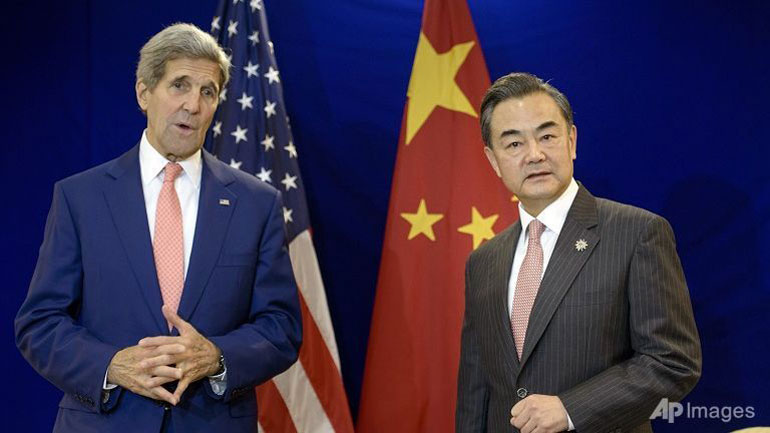Friday Feb 20, 2026
Friday Feb 20, 2026
Saturday, 9 January 2016 00:00 - - {{hitsCtrl.values.hits}}

China’s Foreign Minister Wang Yi (R) listens while U.S. Secretary of State John Kerry talks before a bilateral meeting at the Putra World Trade Center in Kuala Lumpur, Malaysia on Aug 5, 2015. (Photo: Brendan Smialowski/Pool Photo via AP)
Reuters: WASHINGTON: The United States called on China to end ‘business as usual’ with its ally North Korea after Pyongyang defied world powers by saying it had tested a hydrogen bomb, while South Korea prepared to retaliate by broadcasting propaganda across the border.
South Korea, which has grown increasingly close to China in recent years, said its foreign minister would speak with his Chinese counterpart later on Friday (8 Jan).
US Secretary of State John Kerry said on Thursday he had made clear in a phone call with Chinese Foreign Minister Wang Yi that China’s approach to North Korea has not succeeded.
“China had a particular approach that it wanted to make, that we agreed and respected to give them space to implement that,” Kerry told reporters. “Today in my conversation with the Chinese I made it very clear that has not worked and we cannot continue business as usual.”
China is the North’s main economic and diplomatic backer, although relations between the two Cold War allies have cooled in recent years.
China’s foreign ministry said after the call with Kerry that Beijing was willing to communicate with all parties, including the United States.
“Wang Yi stressed that China has staunchly dedicated itself to the goal of the peninsula’s decentralisation and to maintaining peace and stability on the peninsula,” the Chinese Foreign Ministry said in a short statement.
South Korea’s foreign ministry had requested a phone call with Wang since directly after North Korea announced on Wednesday it had tested a hydrogen bomb, the South’s Yonhap News Agency said. However, the call had been delayed due to China’s ‘internal scheduling’, it said, citing an unnamed official.
South Korea’s propaganda broadcasts by loudspeaker across the heavily militarised border, known to infuriate the leadership of isolated North Korea, were due to begin at noon local time (11 a.m., Singapore time) on Friday.
The last time Seoul deployed the speakers, in retaliation for a landmine blast in August that wounded two South Korean soldiers; it led to an armed standoff and exchange of artillery fire.
South Korea heightened military readiness to its highest level at locations near the loudspeakers, and Seoul vowed to retaliate against any attack on the speakers.
The South Korean city of Paju, which sits along the border with North Korea, suspended tours of the Demilitarised Zone (DMZ) at the military’s request.
Seoul had also raised South Korea’s cyber security alert level. Yonhap also reported that North Korea had boosted troop deployments and raised its surveillance of the South.
Wednesday’s test angered both the United States and China, which was not given prior notice, although the US government and weapons experts doubt Pyongyang’s assertion that the device it exploded was a hydrogen bomb.
The vast majority of North Korea’s business dealings are with China, which bought 90% of the isolated country’s exports in 2013, according to data compiled by South Korea’s International Trade Association.